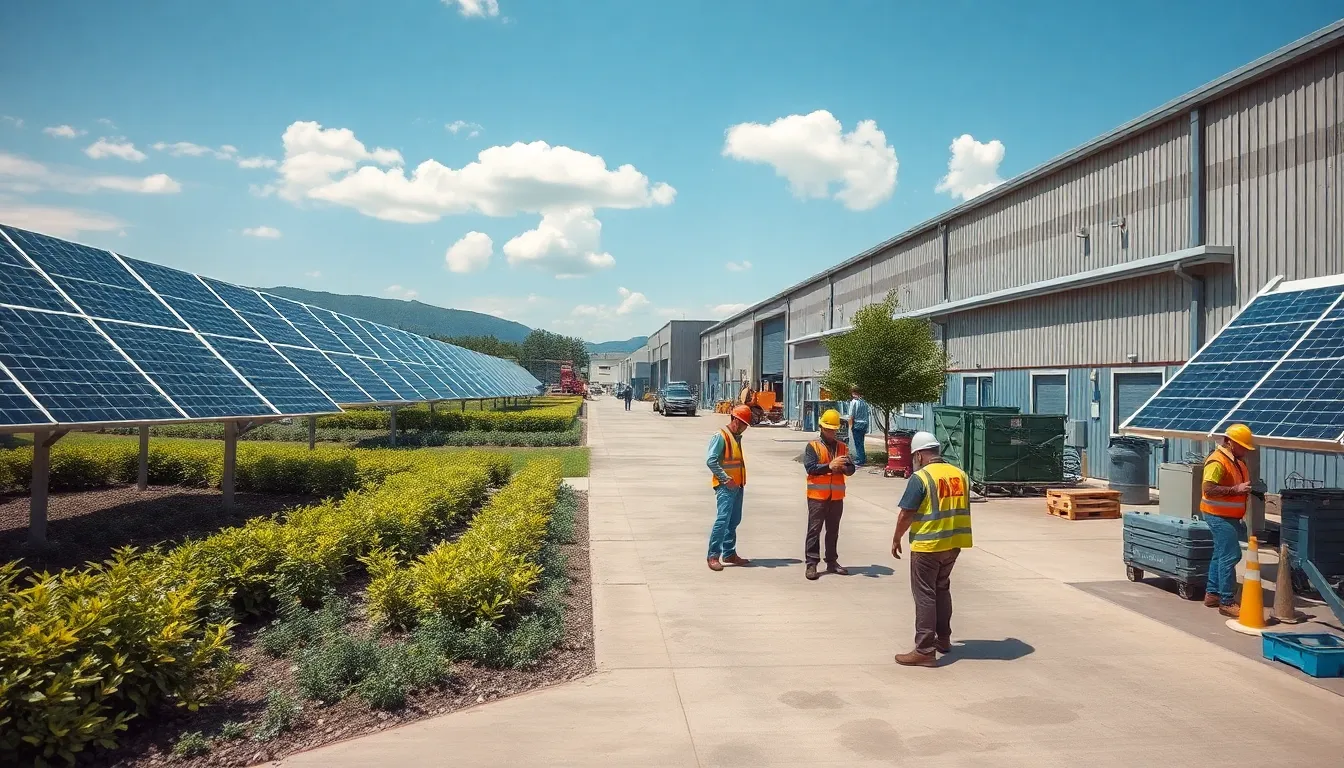Table of Contents
ToggleClimate change isn’t just a buzzword tossed around at dinner parties; it’s the elephant in the room that’s slowly melting. With temperatures rising and weather patterns going haywire, the call for climate action has never been more urgent. It’s time to roll up those sleeves and take a stand—because who wants to live in a world where summer feels like a sauna and winter’s just a chilly tease?
Understanding Climate Action
Climate action comprises measures taken to combat climate change and its effects. It includes reducing greenhouse gas emissions, enhancing energy efficiency, and promoting renewable energy sources. Addressing climate change demands immediate responses from individuals, governments, and businesses alike.
Individuals play a crucial role in this movement. They can adopt sustainable practices, such as reducing carbon footprints through less energy consumption and waste. Communities benefit from collective efforts in climate education and grassroots initiatives that foster awareness and collaboration.
Governments worldwide are also pivotal in implementing climate action. They develop policies that support carbon neutrality goals and invest in sustainable infrastructure. Legislation that targets emissions reductions aids in transitioning to a low-carbon economy, while international agreements such as the Paris Agreement set collective targets for nations.
Businesses contribute significantly to climate action efforts. Organizations can adopt sustainability measures that lead to lower emissions and resource consumption. Corporate social responsibility initiatives encourage companies to engage in practices that prioritize environmental protection while remaining profitable.
A variety of strategies can expedite climate action. Increasing green spaces within urban areas helps sequester carbon dioxide, while public transportation improvements reduce reliance on fossil fuels. Together, these strategies illustrate how multifaceted climate action can effectively address the climate crisis.
Data underscores the need for urgency. According to the Intergovernmental Panel on Climate Change, global emissions must peak by 2025 and decline by 43% by 2030 to limit warming to 1.5°C. Adopting an aggressive approach to climate action enhances the possibilities of achieving such targets and securing a sustainable future for all.
Importance of Climate Action

Taking climate action is crucial for maintaining the planet’s health and securing a sustainable future. Addressing climate change fosters a healthier environment and bolsters economic stability.
Environmental Benefits
Reducing greenhouse gas emissions directly leads to improved air quality. Cleaner air supports public health, resulting in fewer respiratory illnesses. Protecting ecosystems contributes to biodiversity and stabilizes climate systems. More green spaces enhance urban environments, providing habitats for wildlife and improving residents’ quality of life. Enhancing energy efficiency and promoting renewable energy sources further decrease reliance on fossil fuels, facilitating a transition to sustainable practices. Climate action, therefore, not only mitigates the effects of climate change but also preserves crucial natural resources for future generations.
Economic Benefits
Investments in clean energy technologies create jobs in emerging sectors. Job growth in renewable energy industries demonstrates an upward trend, with the potential for millions of positions worldwide. Sustainable practices for businesses lead to long-term savings through decreased energy costs. Communities benefit as green projects stimulate local economies while improving infrastructure. Lastly, taking proactive measures against climate change reduces the financial burden associated with disasters. Adopting these strategies ensures a resilient economy and fosters innovation that positions societies for a prosperous future.
Key Strategies for Climate Action
Climate action involves proactive measures aimed at addressing climate change through various strategies. These strategies encompass the implementation of renewable energy solutions and the advancement of sustainable transportation methods.
Renewable Energy Implementation
Implementing renewable energy sources significantly reduces greenhouse gas emissions. Solar, wind, and hydropower generate clean energy, decreasing reliance on fossil fuels. According to the International Renewable Energy Agency, transitioning to 100% renewable energy can help limit global warming. Investments in solar power double every two years in many regions, showcasing a shift towards sustainability. Enhancing grid efficiency along with battery storage technology supports consistent energy supply regardless of weather conditions. Governments incentivizing renewable energy projects bolster economic growth while ensuring sustainable practices.
Sustainable Transportation Solutions
Developing sustainable transportation solutions transforms urban mobility and decreases carbon footprints. Public transit systems powered by clean energy lower emissions while providing accessible travel options. Electric vehicles, particularly when charged with renewable energy, provide cleaner alternatives to traditional cars. Biking infrastructure promotes active transport, fostering healthier lifestyles while reducing congestion. Implementing congestion pricing encourages the use of public transportation, reducing vehicle reliance. Cities focusing on pedestrian-friendly designs enhance walkability, creating vibrant communities. Collectively, these strategies contribute significantly to reducing emissions and combatting climate change.
Global Climate Action Efforts
Global climate action encompasses various coordinated efforts aimed at addressing climate change on multiple levels. These efforts engage international bodies, governments, communities, and individuals.
International Agreements
International agreements play a crucial role in fostering collaborative climate action. The Paris Agreement, adopted in 2015, sets ambitious targets for limiting global temperature rise to well below 2°C, aiming for 1.5°C. Countries commit to reducing greenhouse gas emissions in accordance with nationally determined contributions, reflecting tailored national strategies. Such agreements also promote financial mechanisms to support developing nations in their transition to sustainable practices. Another significant initiative includes the Glasgow Climate Pact, which emphasizes the need for countries to accelerate their emission reduction commitments.
Local Initiatives
Local initiatives contribute significantly to effective climate action. Cities around the world implement programs focusing on energy efficiency and sustainable urban planning. For instance, initiatives promoting community gardens enhance local food security while absorbing carbon. Many municipalities have adopted green building standards to reduce energy consumption. Transitioning community buses to electric models represents another impactful action. Numerous local organizations also engage in climate education to empower residents in adopting sustainable practices. By championing these local efforts, communities create a collective impact that contributes to national and global climate goals.
Challenges in Climate Action
Climate action faces numerous challenges that hinder progress. These obstacles encompass political barriers and public perception, both of which require addressing for effective climate strategies.
Political Barriers
Political barriers significantly impede climate action. Leaders often prioritize short-term goals over long-term sustainability. Opposition from interest groups can derail comprehensive policies aimed at reducing greenhouse gas emissions. Legislative gridlock frequently prevents the passage of vital climate measures. Uncertainty around political support for climate initiatives discourages investments in renewable energy. Collaboration between different government levels often presents challenges, slowing the implementation of critical reforms. Additionally, the influence of fossil fuel industries in politics creates resistance to transitioning towards clean energy solutions.
Public Perception
Public perception plays a crucial role in shaping climate action efforts. Many individuals remain unaware of the severity of climate change impacts, resulting in a lack of urgency. Misleading information can foster skepticism about climate science, complicating advocacy campaigns. The prioritization of economic concerns often overshadows environmental issues in public discourse. Engaging diverse communities in climate discussions enhances awareness and drives collective action. Ultimately, fostering a better understanding of climate challenges and solutions is vital for building support for necessary measures.
Taking decisive climate action is not just a necessity but an obligation for everyone. The urgency of the situation calls for immediate and collective efforts to combat climate change. By adopting sustainable practices and supporting policies that prioritize environmental health, individuals can make a significant difference.
Governments and businesses must also play their part by investing in renewable energy and sustainable infrastructure. As communities unite in these efforts, they can create a powerful movement toward a healthier planet.
The future depends on the actions taken today. Embracing climate action can lead to a sustainable world where both people and nature thrive. It’s time to act and ensure a livable planet for generations to come.







